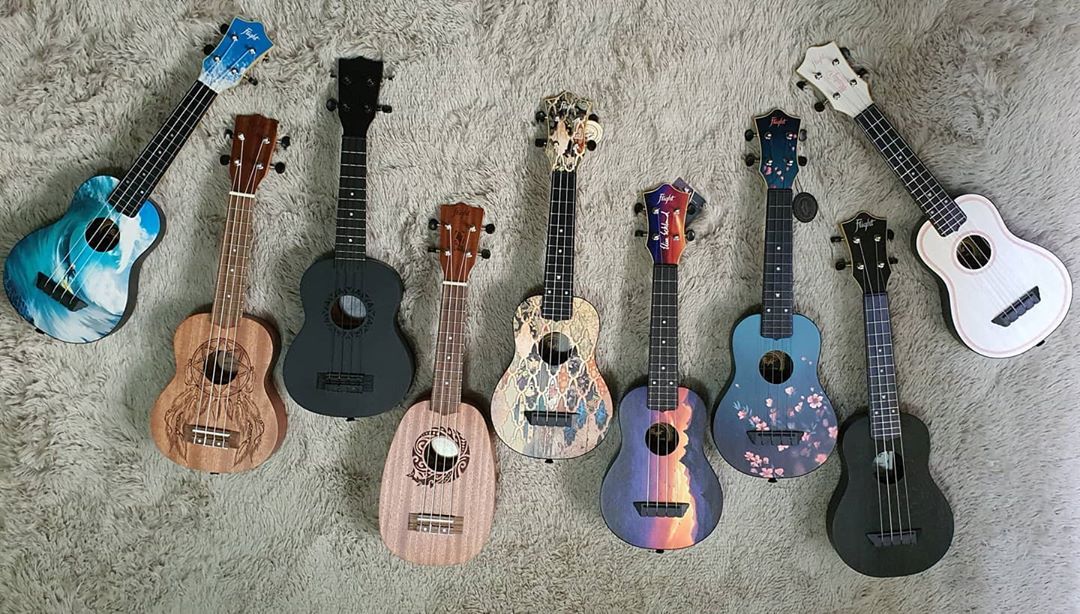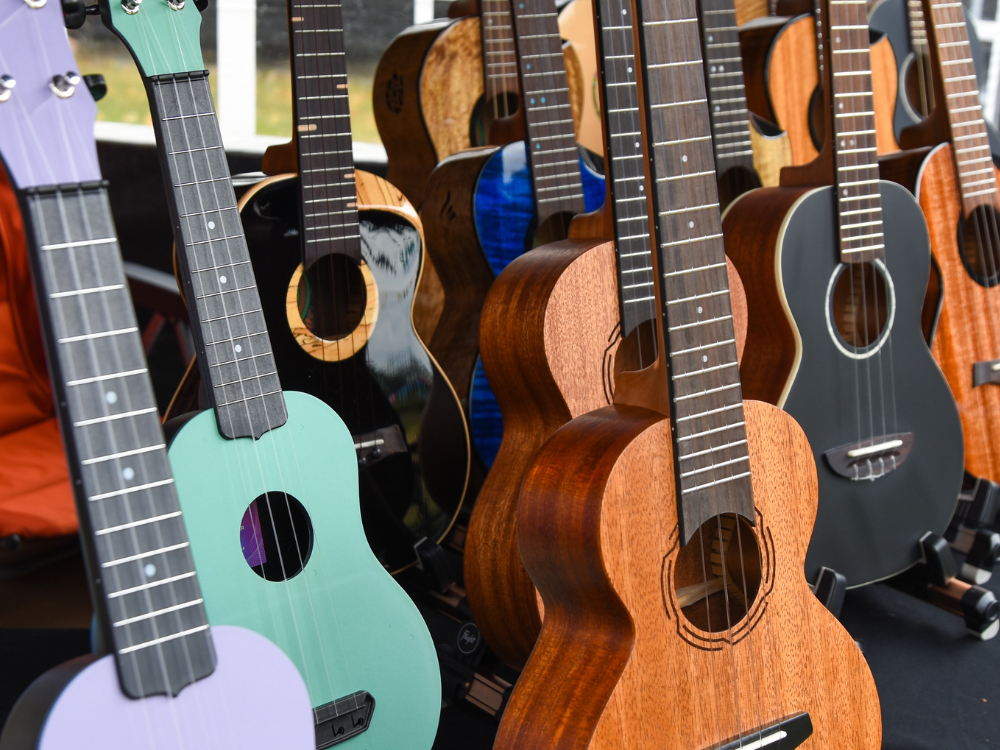Italian-born, Brighton-based singer-songwriter Julia Traser contemplates this notion on her debut album Perfect Timing, a…

How To Fight The Ukulele Acquisition Syndrome
BY MATT HICKS
What’s this? A ukulele manufacturer giving out remedies to a condition which causes you to buy more ukuleles?
Let’s get something straight. You deserve to enjoy the instrument you’ve worked so hard to save up for. You should get the very best out of your ukulele before you even contemplate buying your next one.
Now you may be someone who has an unlimited budget and just enjoys collecting ukuleles. That’s fine. I am cool with that but, if that is all you’re in it for, then you don’t need to read further. But there are some for whom buying more and more ukes is a symptom of something I call “The beautiful deficit”. You’re maybe already experiencing it. You really should be saving for your gap year but, you know, that wood grain is lovely on that mango soprano. The people you share a house with are having to move ukuleles out of their way to even have a conversation with you but it’s fine because you’ll just buy this one and then you’ll stop.
Before I go any further. There are also those who do not have the budget to buy another uke. In fact you barely managed to get the money together to buy the one you had. Please do read on. Flight ukulele will never sell you a ukulele that you can’t get the full ukulele experience out of (even at the lowest end of the price range) and this article is going to help you help you achieve it.
Oh dear, Matt is getting philosophical……
The “beautiful deficit” is that thing in life which gives you just enough of a sense of lacking about something for you to get up out of bed to fill that gap. In many ways one could apply it to happiness as an example. If we were all truly happy then we wouldn’t strive to find happiness or maintain our current state of happiness. That wariness of being sad or even the craving to be happy compels us to find or keep the things that bring us closest to that feeling. The beautiful deficit is the thing that brings us ambition, enthusiasm and focus.
For further information I wouldn’t google “beautiful deficit” as it’s a term I’ve totally made up but I’m sure you can all relate to it. It’s the thing that makes us google “clawhammer technique” and finds us spending hours trying to master it from You Tube videos. It is what makes us the achieving humans that we are.
Most of the time, there’s a relatively good balance but sometimes the scales tip and we find ourselves striving a bit too much or even losing sight of what it is we think we’re lacking. I think Ukulele Acquisition Syndrome is a direct example of this.
How? Well part of the beauty of the ukulele is not only its sweet sound and percussive nature. It’s the things it lacks. What are those things? Well guitarists would call it two strings. The lack of bass is another thing. Lack of sustain. Lack of any confused wall of sound that you can hide behind if you make a mistake. The uke takes away all the safe options of a guitar. These are things, as I’ve said in other articles that make you work harder with the instrument. It’s actually what makes you become as good as you are and more.
Now you might ask “if the uke has all these things missing why should I play it?”
Well every instrument has these things. Instruments are designed with an element missing because if they didn’t and you played in an orchestra or group, it would sound awful. A couple in love is a beautiful thing when they complete each other and fill in each other’s gaps. In the same way, every instrument lacks something. It isn’t just unique to the ukulele. Music has always been a community thing. Even the best solo performers can’t perform without the help of others.
My point about UAS is that some people have such an intense sense of the beautiful deficit that they subconsciously think they need another ukulele to fill the gap.
“This soprano is really trebly so I’ll buy a tenor!”
You may well come across people who have literally dozens of ukuleles. All in different sizes, woods, and shapes. Chances are they’re trying to fill a void they’ll never fill.
So my point (trust me I’m getting to it) is that before moving on to your next uke, let’s add a little context and give a few tips so you can make the most of the one you have and maybe even save a bit of money as well.
- The law of diminished returns
This is a really important thing to keep in mind when looking at any instrument. This is the factor that when you start paying over a certain amount for a ukulele, the benefits that you get back begin to decrease. Doubling the price of a ukulele, believe it or not, does not double the volume, tone, and playability of the instrument. In fact sometimes all you are paying for is bling. Shiny gloss, better wood, intricate binding. Don’t get me wrong, these are good things. Some ukuleles are worth hundreds, even thousands because someone has sat down and spent hours producing a masterpiece that sounds amazing but is also visually stunning. A good ukulele will catch your eye as much as be a joy to play. There is a reason, after all, that Flight make their beautiful travel ukes (hyperlink) but when you start to part with a lot of money you need to be careful and be mindful of what your cash is being spent on.
Buying an expensive ukulele will not make you a better ukulele player. If you buy a James Hill signature ukulele, it will not turn you into James Hill. Actually, a really, really great uke firstly might not feel that playable to a novice anyway; but also really playable uke might even compound your bad habits because those bad habits are now easier to play.
You should upgrade your instrument if and when you know you’re playing will get the most out of the quality. You get the sound out of a ukulele. The ukulele doesn’t get the sound out of you. You may also develop to be good enough to perform, in which case you may want an electro acoustic uke. It always dumbfounds me when someone who is just starting buys an instrument with a pickup. You’re paying extra for something you don’t need yet.
Hold out, get better and when you’re ready and you have your own style, you’ll be more likely to spend out on an instrument that is most suited to your needs.
- The Box of Delights
I cannot reiterate enough just how important it is to get to know your ukulele. You can learn all the chords, scales and strum patterns and be the belle of your ukulele group; but there will come a point for many of you where you want find your own voice with your instrument. This may sound a little bit strange and it’s hard to describe but; if you listen to Jake Shimabukuro and Tamaine Gardner, you can tell quite clearly from the sound alone, who is who. If you listen to James Hill and Aaron Keim; again, although they play very similar music, you will be able to tell the difference. All these artists, without exception, have found their own voice.
What gives you your voice is obviously, your ability, the structure of your hands, your posture, your own musical tastes but, very importantly, it is the ukulele you’re playing at the time. I would argue that if you find yourself flitting between many ukuleles, you may well find you become a little lost in how you want to sound. Think that’s a stupid point? I once had two concert sized ukuleles made out of the same wood and technically the same shape and price point. One of them was perfect for clawhammer and bluegrass. The other was perfect for more jazz orientated chords. Apart from a slight difference in action, I have never been able to really put my finger on the difference but it is there nonetheless. That small box of cleverly structured wood (and I include laminate woods in this), carries literally years and years of new discoveries in its sound. I have mentioned before how percussive ukuleles are. If you play the same thing in the same way for years you probably won’t discover anything new. Try different styles, push yourself, take yourself out of your comfort zone and even that ukulele that you spent £/$/Euros 50 on will unleash new sounds and discoveries that will rock your world. They’ll be subtle, sure, but they’ll be there. Play the same way and flit from one uke to the next and you’ll miss out.
- Speak to the hand….
Now here’s a point that makes it look like we’re cutting our noses to spite our face. Learn to read through the blurb that ukulele manufacturers feed you. Every ukulele is made by a company to have a selling point. So very often the blurb will hype up the very obvious.
Hand finished: Often this kind of sounds like it has been hand made. It isn’t. It is still factory made. It just means that someone has looked over the instrument and made sure that parts of it have been filed in the right areas and polished here and there. But guess what? There’s actually nothing wrong with factory made instruments. In fact, most quality instruments under £500 will likely be factory made and that’s a good thing. Quality control, i.e. a person inspecting it at the end of the line should be part and parcel of normal production. You should not be paying more for “hand finished” products. Flight have quality control inspections as part of the normal manufacturing process.
Solid Wood: Now look. A good solid wood uke is lovely. No doubt about it. But under a certain price point it becomes totally irrelevant. I have always said, and I always will, that I will always favour a really well made laminate wood ukulele over a moderately well made solid wood one. Many manufacturers will make cheap ukuleles and say they are solid wood. Well maybe they’re telling the truth but very often they’re telling you tales. I have lost count of the amount of instruments under £100 that are advertised as solid wood and yet are actually laminate (re-constituted layered sheets of wood). Flight use laminate woods. They’re proud of that fact. There’s a great tradition of making brilliant ukuleles with laminate woods. They also use solid wood. The method for Flight is to use the best material to bring you the best sound and quality in the price range for that uke.
Oh and just for the record- There is no such thing as Portuguese koa or in fact any koa that is grown outside of Hawaii. If a company sells their uke as being made out of Portuguese koa, it is actually acacia.
Beauty is actually a Beast
Some manufacturers put a lot of effort into making a cheap ukulele look amazing. They’ll put binding on and etch patterns on the top of the uke. This is all very pretty and may well spell bind you but very often these things are added with little thought given to the quality and structure of a ukulele. Laser etching is something Flight includes in some ukes but you’ll never see it underneath the bridge or where the fretboard meets with the body. Etching can affect the integrity of the wood, especially if it is laminate. You shouldn’t have to experience your bridge falling off your instrument. No uke looks pretty then! If a cheap ukulele looks amazing, then you need to be asking how much of that money has actually gone into the quality of the instrument. Again, Flight like pretty ukuleles. They love making them, but they never put artistic design over the quality of the instrument. One of my favourite ukuleles is my Flight MUS-2 Soprano. It is, in terms of “bling” as basic as you can get (between you and me, I prefer less bling” but the cost of the uke has gone into total quality build.
So this slightly lengthened article I hope has inspired you to go back to your first uke and dust it off (provided it’s a decent uke in the first place). I hope that it has, at least, made you think about getting the very most out of the instrument you have. The beauty of guitars and ukuleles these days is that you do not need to spend a fortune to get an amazing sound. The major expense on your part after paying for a ukulele is time; and time spent with your ukulele is probably the soundest investment you can make.
About the author:
Matt Hicks has been a guitarist and ukulele player for longer than he cares to admit. He is particularly known for his command of the claw hammer technique and his “clawhammer cheat” technique. Matt believes that the ukulele is one of the most versatile folk instruments. He believes that building community around music is one of the most powerful forces right now and the uke is his favourite medium. He has taught and performed at most of the UKs top ukulele festivals and gigs around the UK with his mix of original songs and old American song covers.



